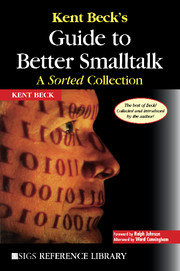Book contents
- Frontmatter
- Contents
- FOREWORD
- PREFACE
- INTRODUCTION
- 1 A DIAGRAM FOR OBJECT-ORIENTED PROGRAMS
- 2 CONSTRUCTING ABSTRACTIONS FOR OBJECT-ORIENTED APPLICATIONS
- 3 PLAYRGOUND: AN OBJECT ORIENTED SIMULATION SYSTEM WITH AGENT RULES FOR CHILDREN OF ALL AGES
- 4 A LABORATORY FOR TEACHING OBJECT-ORIENTED THINKING
- 5 THINK LIKE AN OBJECT
- 6 WHY STUDY SMALLTALK IDIOMS?
- 7 THE DREADED SUPER
- 8 ABSTRACT CONTROL IDIOMS
- 9 VALUEMODEL IDIOMS
- 10 COLLECTION IDIOMS
- 11 AN OBJECTWORKS\SMALLTALK 4.1 WRAPPER IDIOM
- 12 A SHORT INTRODUCTION TO PATTERN LANGUAGE
- 13 WHOLE LOTTA SMALLTALK: THE TECHNOLOGY
- 14 INSTANCE-SPECIFIC BEHAVIOR: HOW AND WHY
- 15 INSTANCE-SPECIFIC BEHAVIOR: DIGITALK IMPLEMENTATION AND THE DEEPER MEANING OF IT ALL
- 16 TO ACCESSOR OR NOT TO ACCESSOR
- 17 INHERITANCE: THE REST OF THE STORY
- 18 INHERITANCE: THE REST OF THE STORY (CONT.)
- 19 HELPER METHODS AVOID UNWANTED INHERITANCE
- 20 IT'S NOT JUST THE CASE
- 21 CRC: FINDING OBJECTS THE EASY WAY
- 22 DEATH TO CASE STATEMENTS
- 23 WHERE DO OBJECTS COME FROM?
- 24 PATTERNS AND SOFTWARE DEVELOPMENT
- 25 DISTRIBUTED SMALLTALK
- 26 WHERE DO OBJECTS COME FROM? FROM VARIABLES AND METHODS
- 27 BIRDS, BEES, AND BROWSERS—OBVIOUS SOURCES OF OBJECTS
- 28 USING PATTERNS: DESIGN
- 29 PATTERNS GENERATE ARCHITECTURES
- 30 SIMPLE SMALLTALK TESTING
- 31 ARCHITECTURAL PROTOTYPE: TELEVISION REMOTE CONTROL
- 32 DEMAND LOADING FOR VISUALWORKS
- 33 GARBAGE COLLECTION REVEALED
- 34 WHAT? WHAT HAPPENED TO GARBAGE COLLECTION?
- 35 SUPER + 1
- 36 CLEAN CODE: PIPE DREAM OR STATE OF MIND?
- 37 A MODEST META PROPOSAL
- 38 USES OF VARIABLES: TEMPS
- 39 VARIABLES OF THE WORLD
- 40 PATTERNS 101
- 41 FAREWELL AND A WOOD PILE
- AFTERWORD
- INDEX
20 - IT'S NOT JUST THE CASE
Smalltalk Report, November–December, 1993
Published online by Cambridge University Press: 04 August 2010
- Frontmatter
- Contents
- FOREWORD
- PREFACE
- INTRODUCTION
- 1 A DIAGRAM FOR OBJECT-ORIENTED PROGRAMS
- 2 CONSTRUCTING ABSTRACTIONS FOR OBJECT-ORIENTED APPLICATIONS
- 3 PLAYRGOUND: AN OBJECT ORIENTED SIMULATION SYSTEM WITH AGENT RULES FOR CHILDREN OF ALL AGES
- 4 A LABORATORY FOR TEACHING OBJECT-ORIENTED THINKING
- 5 THINK LIKE AN OBJECT
- 6 WHY STUDY SMALLTALK IDIOMS?
- 7 THE DREADED SUPER
- 8 ABSTRACT CONTROL IDIOMS
- 9 VALUEMODEL IDIOMS
- 10 COLLECTION IDIOMS
- 11 AN OBJECTWORKS\SMALLTALK 4.1 WRAPPER IDIOM
- 12 A SHORT INTRODUCTION TO PATTERN LANGUAGE
- 13 WHOLE LOTTA SMALLTALK: THE TECHNOLOGY
- 14 INSTANCE-SPECIFIC BEHAVIOR: HOW AND WHY
- 15 INSTANCE-SPECIFIC BEHAVIOR: DIGITALK IMPLEMENTATION AND THE DEEPER MEANING OF IT ALL
- 16 TO ACCESSOR OR NOT TO ACCESSOR
- 17 INHERITANCE: THE REST OF THE STORY
- 18 INHERITANCE: THE REST OF THE STORY (CONT.)
- 19 HELPER METHODS AVOID UNWANTED INHERITANCE
- 20 IT'S NOT JUST THE CASE
- 21 CRC: FINDING OBJECTS THE EASY WAY
- 22 DEATH TO CASE STATEMENTS
- 23 WHERE DO OBJECTS COME FROM?
- 24 PATTERNS AND SOFTWARE DEVELOPMENT
- 25 DISTRIBUTED SMALLTALK
- 26 WHERE DO OBJECTS COME FROM? FROM VARIABLES AND METHODS
- 27 BIRDS, BEES, AND BROWSERS—OBVIOUS SOURCES OF OBJECTS
- 28 USING PATTERNS: DESIGN
- 29 PATTERNS GENERATE ARCHITECTURES
- 30 SIMPLE SMALLTALK TESTING
- 31 ARCHITECTURAL PROTOTYPE: TELEVISION REMOTE CONTROL
- 32 DEMAND LOADING FOR VISUALWORKS
- 33 GARBAGE COLLECTION REVEALED
- 34 WHAT? WHAT HAPPENED TO GARBAGE COLLECTION?
- 35 SUPER + 1
- 36 CLEAN CODE: PIPE DREAM OR STATE OF MIND?
- 37 A MODEST META PROPOSAL
- 38 USES OF VARIABLES: TEMPS
- 39 VARIABLES OF THE WORLD
- 40 PATTERNS 101
- 41 FAREWELL AND A WOOD PILE
- AFTERWORD
- INDEX
Summary
Okay, back to tilting at windmills. Sometimes I think people just don't get Smalltalk. Why in the world would you want a grungy old explicit case statement when you have a superior substitute in the polymorphic message? How could you read and write Smalltalk code for enough years to be able to implement new language features and not understand that you didn't need them?
I guess my tights and cape aren't far enough at the back of the closet…
This month's topic is case statements: practical necessity or pernicious contaminant? My interest in the topic comes from several areas at once. SmalltalkAgents has added a form of case statement to their Smalltalk for the Macintosh. CompuServe has hosted a lively discussion of isKindOf: and its relatives. Finally, net news has had a discussion of case statements. What's the deal?
Cutting right to the punch line, I think case statements are an inappropriate holdover from procedural thinking. While vital in procedural languages, their use in object programs is obviated by the much more powerful mechanism of the polymorphic message send. Anytime you find yourself wishing for or using a case statement, you have an opportunity to take advantage of objects instead. The noncase version will yield a more maintainable, more flexible, more readable, and faster solution.
Information
- Type
- Chapter
- Information
- Kent Beck's Guide to Better SmalltalkA Sorted Collection, pp. 201 - 204Publisher: Cambridge University PressPrint publication year: 1997
